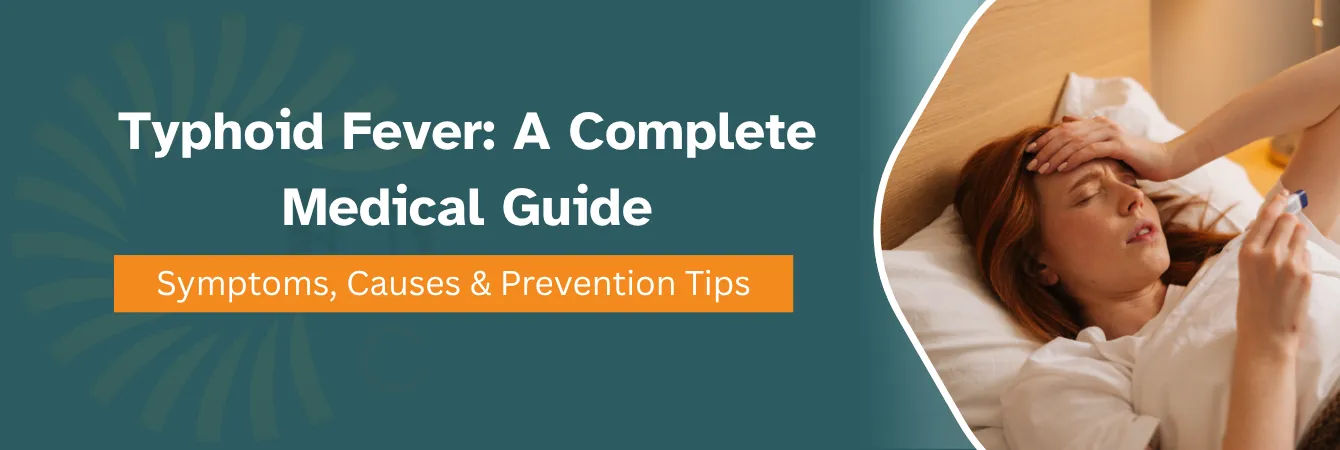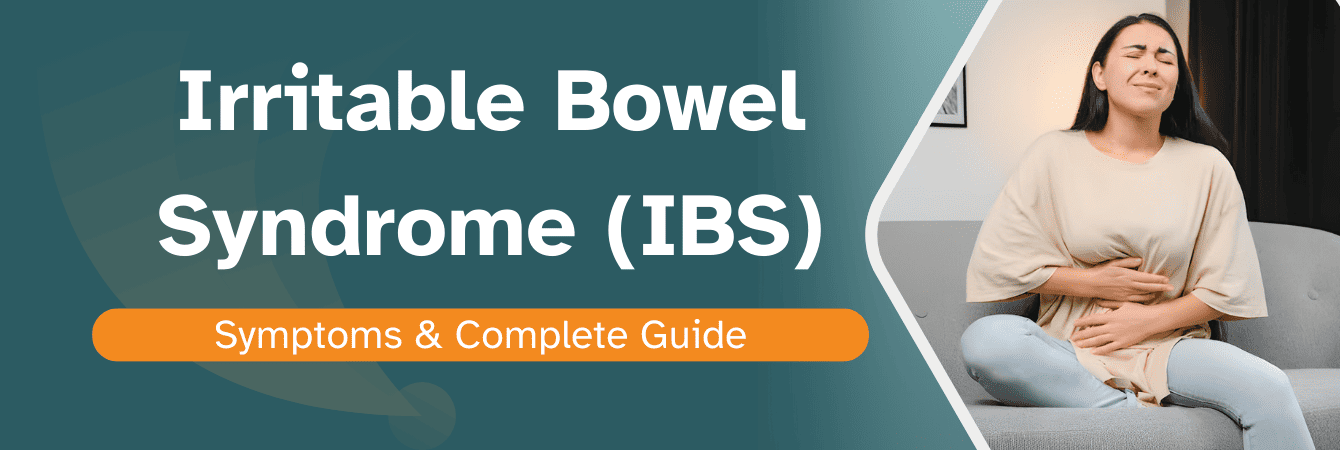What Is Typhoid Fever? Causes, Symptoms & Prevention Tips
- August 6, 2025
- Abrol Hospital
Typhoid fever is a bacterial infection that can affect the entire body but primarily targets the intestinal tract and bloodstream. It’s caused by the Salmonella enterica serotype Typhi bacterium, which enters the body through contaminated food or water. In regions of the world with poor sanitation, typhoid fever is common.
If treatment is not received, this illness can result in serious side effects such as internal bleeding and intestinal perforation. However, with early diagnosis and proper antibiotic treatment, most people recover fully. Understanding what typhoid fever is, along with its causes and symptoms, is crucial for effective prevention and control. Consulting experienced Internal Medicine specialists can help ensure accurate diagnosis and proper care.
What Causes Typhoid Fever?
Consuming food or water tainted with Salmonella Typhi bacteria is the cause of typhoid illness.. Unlike other strains of Salmonella that cause temporary food poisoning, Salmonella Typhi can multiply in the body, invade the bloodstream, and result in prolonged illness.
Once inside the human body, the bacteria travel from the intestines into the bloodstream, where they are carried to various organs. Typhoid is highly contagious and can also be spread by individuals who are carriers — people who have recovered but still carry the bacteria in their body, unknowingly transmitting it to others.
How Typhoid Fever Spreads to People
Understanding how typhoid fever spreads is vital in preventing it. The infection primarily spreads through:
Contaminated drinking water: In areas with poor sanitation, water supplies are easily polluted with human feces containing S. Typhi.
Contaminated food: Food that is handled by someone with poor hand hygiene or prepared in unhygienic conditions can harbor the bacteria.
Direct contact with an infected person: Especially if proper hygiene is not practiced.
Asymptomatic carriers: Some people can harbor the bacteria in their gallbladders and shed it in feces for months or years without showing any symptoms.
This is why typhoid outbreaks often occur in regions where public health systems are underdeveloped.
⚠️ Early Symptoms of Typhoid Fever
The early symptoms of typhoid fever typically appear within 6 to 30 days after exposure. These symptoms can be mistaken for other common illnesses, which is why many cases go undiagnosed initially. To avoid serious problems, early detection and treatment are essential.
Common Signs and Symptoms:
High Fever: The most consistent symptom is a gradually rising fever, reaching up to 103°F–104°F (39°C–40°C) over several days.
Fatigue and Weakness: The infection can drain your energy quickly, causing extreme tiredness.
Abdominal Pain: Cramps or abdominal pain is common due to inflammation of the intestinal lining.
Loss of Appetite: Most people experience a significant decline in hunger.
Constipation or Diarrhea: Depending on the individual, both symptoms can occur. Children are more likely to have diarrhea, while adults may be constipated.
Headaches and Body Aches: These resemble flu-like symptoms and can mislead diagnosis.
Rose-Colored Rash: Some patients, especially children, may develop small, rose-colored spots on the trunk or chest.
If you’re experiencing these symptoms — especially after traveling to or living in a typhoid-prone area — consult a doctor immediately for diagnosis and treatment.
How to Prevent Typhoid Fever
Prevention is the best strategy, especially if you’re traveling to or living in high-risk regions. Below are key typhoid prevention tips that can protect you and your family.
1. Get Vaccinated
There are two main types of typhoid vaccines:
Injectable (inactivated) vaccine
Oral (live attenuated) vaccine
Vaccination is not 100% effective but significantly reduces the risk of infection. It is strongly recommended for:
International travelers to high-risk countries
People working in laboratories or sanitation departments
Children in endemic areas
2. Practice Safe Food and Water Habits
A major component of how to prevent typhoid fever is ensuring food and water safety. Follow these rules:
Drink only boiled, bottled, or purified water
Avoid ice cubes unless made from safe water
Eat freshly cooked hot food
Stay away from raw salads or unpeeled fruits unless you wash and peel them yourself
Avoid street food in high-risk areas
3. Maintain Proper Hygiene
Good hygiene practices go a long way in preventing typhoid in children and adults alike. Make these a daily habit:
Wash hands thoroughly with soap and water before eating or preparing food, and after using the toilet
Teach kids the importance of handwashing
Avoid sharing utensils or cups with others in endemic areas
4. Improve Community Sanitation
Addressing systemic sanitation issues helps reduce typhoid cases long-term:
Use toilets instead of open defecation
Dispose of human waste properly
Ensure your community has access to clean water and safe sewage systems
Supporting clean water initiatives and public health education also plays a vital role in typhoid eradication.
Book a Consultation with Our Typhoid Specialist Today
Typhoid fever is a serious health concern that should never be ignored. If you or a loved one is experiencing symptoms like persistent high fever, abdominal discomfort, or fatigue, especially after travel or exposure to contaminated food or water, it’s essential to seek professional help.
👉 Don’t wait for complications to arise. Early diagnosis and proper treatment can make all the difference.
FAQs (Frequently Asked Questions)
While both conditions may present with nausea, stomach cramps, and diarrhea, typhoid fever is more severe and long-lasting. It's caused by Salmonella Typhi, which enters the bloodstream and affects multiple organs. Food poisoning, on the other hand, is usually short-term and caused by various other bacteria or viruses. Unlike typical food poisoning, typhoid requires antibiotic treatment to recover fully.
Yes. Typhoid fever is highly contagious and can spread from an infected person to others through:
Contaminated hands or surfaces
Improperly handled food or water
Infected individuals who are chronic carriers (they have recovered but still shed the bacteria)
Good hygiene, including frequent handwashing, is essential in stopping the spread.
Absolutely. In fact, preventing typhoid in children is critical because they are more vulnerable to infection. The typhoid vaccine is safe for children over 6 months of age in most cases, and it's highly recommended if:
You live in a typhoid-endemic region
You are planning to travel to high-risk countries
Speak to our doctor for guidance on the best vaccination option for your child.
During recovery, your digestive system is sensitive. Stick to:
Soft, bland foods like boiled rice, bananas, toast, applesauce, and boiled potatoes
Hydrating liquids like clear soups, oral rehydration solutions, and coconut water
Avoid spicy, fried, and high-fiber foods, which can irritate your gut
Your doctor may also recommend nutritional supplements if appetite is severely reduced.
The protection offered by typhoid vaccines varies:
Oral Ty21a vaccine (capsule): Usually offers protection for about 5 years
Injectable Vi polysaccharide vaccine: Typically lasts around 2 years
Booster doses are recommended for people who continue to be at risk. Our clinic provides both vaccine options and guidance on booster scheduling.



